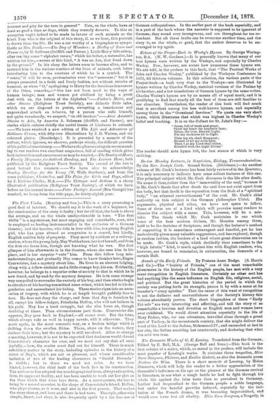The First Violin. (Bentley and Son.)—This is a story possessing
a good deal of interest. We should say it is the work of a beginner, for the construction of the story is faulty ; but for all that, the book is above the average, and on the whole unobjectionable in tone. "The first violin" is a mysterious, but most engaging and remarkable, man, who is employed as leading instrumentalist in the orchestra of a Gorman theatre ; and the heroine, who falls in love with him, is a young English girl, who has gone abroad as companion to a soured, but kindly, English maiden lady of property. They meet by accident at a railway- station, where the young lady,May Wedderburn, has lost herself, and from the first she loves him, though not knowing what he was. Her first glimpse of him afterwards is in the theatre, where she sees him in his place, and in her surprise " cuts " him. From this follow long mis- understandings, and gradually May comes to know thather hero,Eugen Conrvoisier, has a mystery about him. He lives in an obscure lodging, along with a fellow-violinist and a little strange boy, his son. Evidently, however, he belongs to a superior order of society to that in which be is now found, and by-and-by the mystery deepens. He is in some strange way compelled to surrender the custody of his boy, and then stories begin to circulate of his having committed some crime, which has led to his de- gradation and necessitated bis hiding. These stories ripen into an accu- sation of forgery, with which he is at length brought publicly face to face. He does not deny the charge, and from that day is forsaken by all, except his fellow-lodger, Friedhelm Holten, who will not believe in his guilt. May has a bard struggle, but she also loves on, though doubting at times. Then circumstances part them. Courvoisier dis- appears, Me y goes back to England,—all seems over. But the fates, which always rule so well in happy novels, will it otherwise. They meet again, in the most romantic way, on a broken bridge which is drifting down the swollen Rhine. There, alone on the waters, they declare their love ; but the mystery is still unsolved. After so strange a meeting, however, it is not to be expected that darkness would shroud Courvoisier's character for ever, and we need not say that all ends joyfully,—how, the reader must find out for himself. There is much subsidiary matter in the story, including episodes in the history of a sister of May's, which are not SO pleasant, and where considerable imitation of two of the leading characters in "Daniel Deronda ' is visible ; but to these we need not refer. As we have hinted, however, the chief fault of the book lies in its construction. The authoress has adopted the autobiographical form, al ways attractive, from its apparent facility, and has been unable to work out her plot on the lines which that form lays down. As a consequence, she has to bring in a second narrator, in the shape of Courvoisier's friend, Holten, who plays chorus, as it were, and also in the first person. That makes the story clumsy, and here and there in bad-taste. The style, otherwise simple, direct, and clear, is also frequently spoilt by n too free use of
German colloquialisms. In the earlier part of the book especially, and in a part of the book whore the narrator is supposed to be ignorant of German, they sound very incongruous, and are throughout far too re- dundant. But all these faults can be overcome another time, and the story is, on the whole, so good, that the author deserves to be en- couraged to try again.






































 Previous page
Previous page